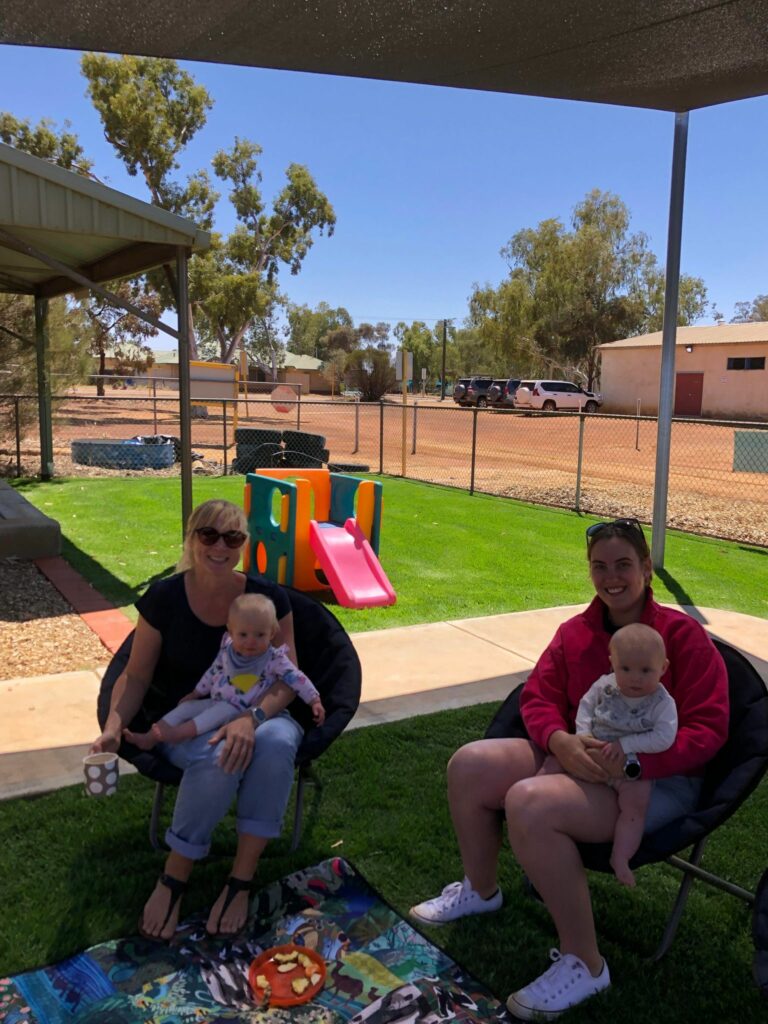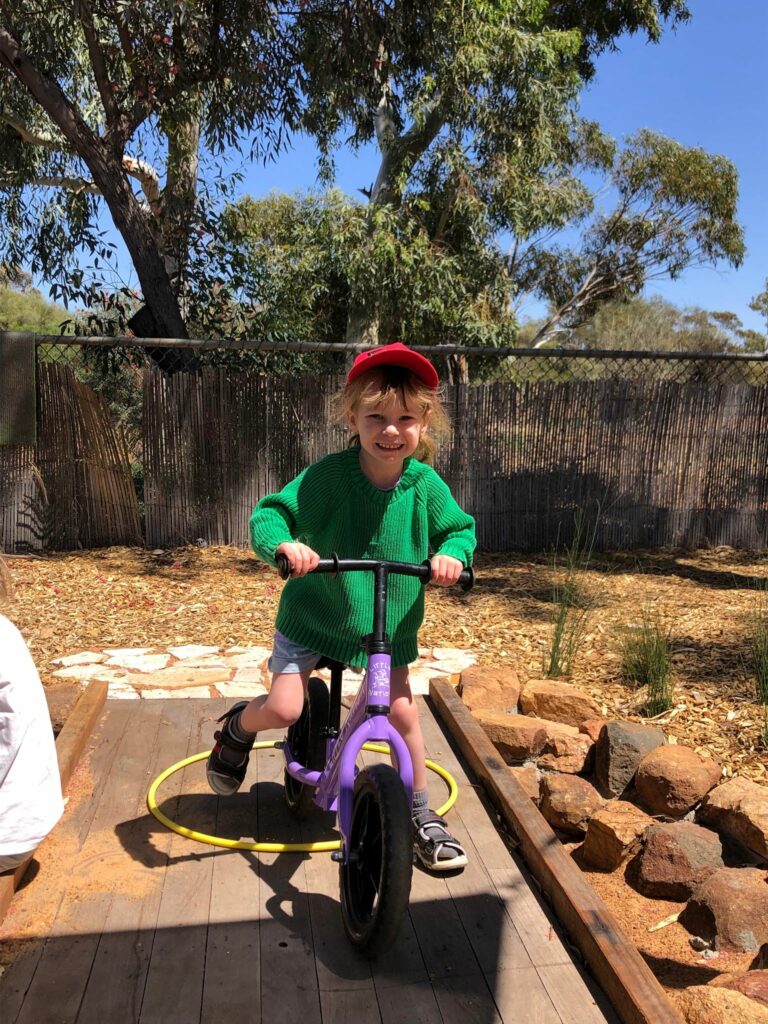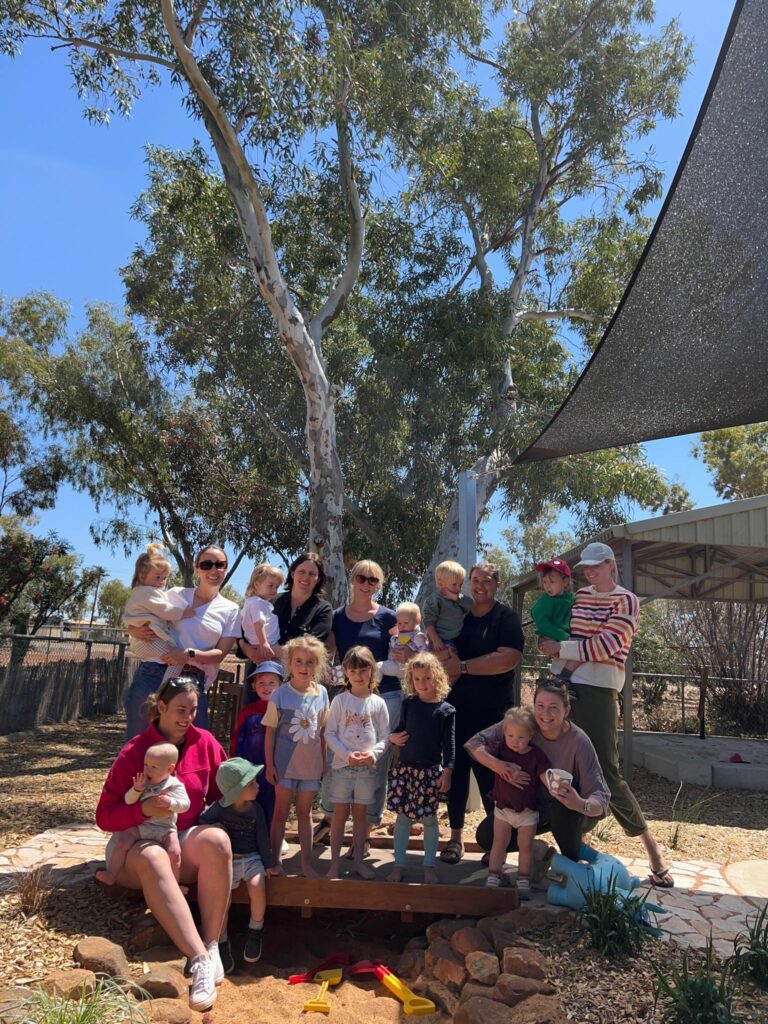Foundation for Rural & Regional Renewal (FRRR)
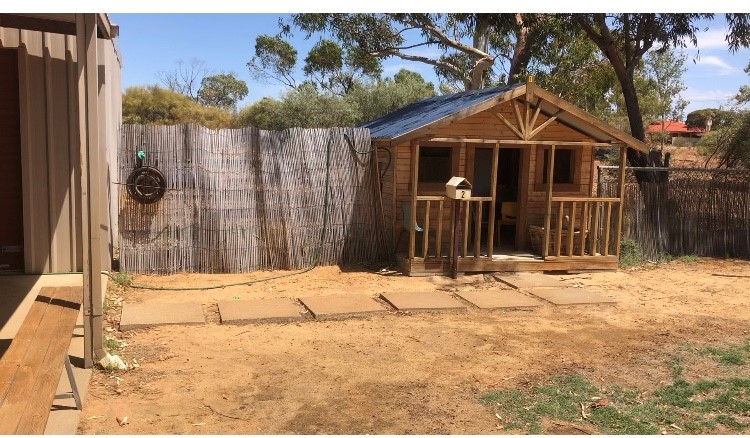 BEFORE
BEFORE
Morawa, a small town in Western Australia’s wheatbelt, lacks recreational and social opportunities for families with young children. With no cafes, the Morawa Playgroup, run for the last 40+ years, by mums (and the odd dad) serves as the primary gathering space for parents and caregivers seeking connection and support. However, Morawa Playgroup’s outdoor area was uninspiring, with a dying lawn and hard claypan soil.
Recognising the need for a vibrant outdoor space, the mums of Morawa Playgroup embarked on a project to transform their drab outdoor area into a nature playground. Collaborating with a local landscape designer, they developed a comprehensive plan to:
- Remove the old, inefficient irrigation system and replace it with a waterwise garden;
- Create a nature play space featuring sensory boxes, timber bridges, and a creek bed;
- Install shade sails to provide relief from the scorching sun and enhance the usability of the outdoor area;
- Establish seating areas for parents to connect and support each other while their children play.
The project unfolded over three years and received a boost from an FRRR grant of $9737, funded by Raine & Horne Foundation.
The completion of the project in September 2023 marked a significant milestone for Morawa Playgroup and the broader community. It’s now the only nature play space in the Shire, which spans 190km2, offering children and parents a welcoming and engaging environment. The shaded, waterwise garden has transformed the outdoor area, allowing children to play outdoors year-round and fostering a sense of connection among families.
Beyond the immediate benefits to the playgroup, the project’s impact extended to Morawa District High School, where reduced water bills freed up funds for educational resources. The positive effects of green spaces on mental wellbeing were evident at the opening of the new play space, signalling a brighter future for the community.
Despite the challenges of being a small, low socio-economic town, the project demonstrates the power of grassroots initiatives to improve quality of life. Morawa Playgroup’s success serves as a testament to the community’s resilience and determination to create a better future for its children and families.
About 70 km north of Roma, in Queensland’s Maranoa district, there is a crossroad, a place that most people pass by. It’s not a barren area – it has its own sense of beauty, but it is not an easy place to live either. It’s known as Roughlie.
In the five years from 2014, this small part of the world experienced pretty much everything the elements could throw at it. They endured floods, fires, severe drought conditions and decreasing commodity prices. But they are a resilient bunch of people.
During these hardships, two farmers – a husband and wife team – offered a parcel of their land to the community for the purpose of establishing a not-for-profit community centre.
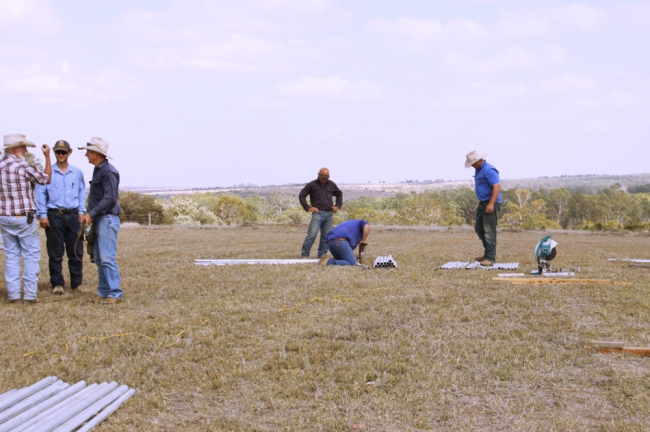
As Lexene Spreadborough, Treasurer of Roughlie Community Centre explains, they saw a need to have a place where the community could come together for physical, emotional and mental wellbeing through social interaction and community involvement.
“[We needed] a place for members of our community and district to come together for mental and moral support is vital during droughts. A community space allows drought-affected farmers and graziers to support each other – improving community connectivity and in turn build a stronger community.
“The Roughlie Community Centre Inc. was established in July 2014, and by the October we had 40 members forming the working committee. All members and the community were volunteers with no paid staff.
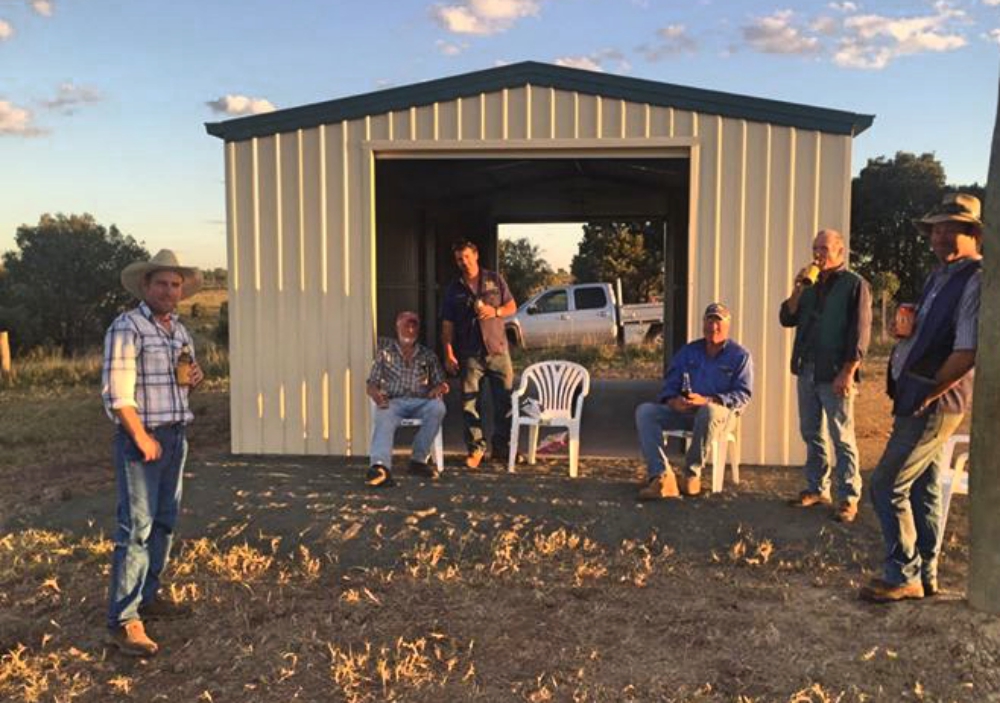
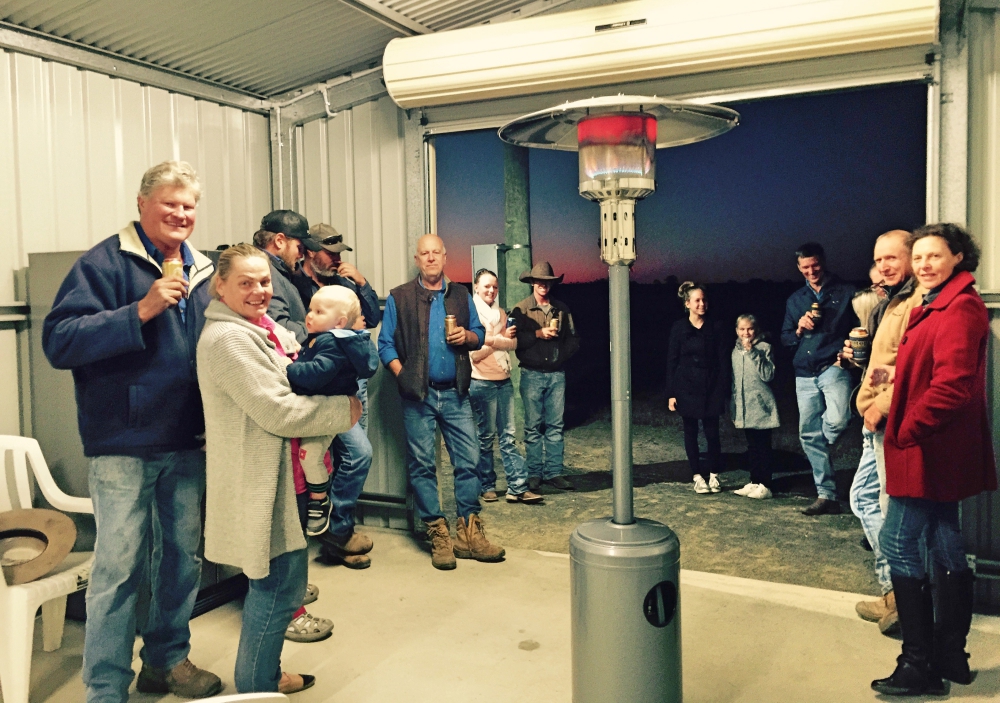
“Our vision was to have a centre to be used for social functions, sporting and recreational activities and to provide a venue for industry groups for workshops, seminars and field days. But we needed somewhere to meet, as there was no community meeting place in our district,” said Ms Spreadborough.
The ‘It started with a Shed’ project was borne, as part of the first stage in their shared vision.
“We received a $9,990 grant through FRRR’s Tackling Tough Times Together program to build a Shed for the community to come together to fundraise and plan the centre. The money, which we know came from the Tim Fairfax Family Foundation, was a catalyst for further funds, with substantial additional donations being made to connect the power, install a rain tank, a BBQ and stainless-steel benches. Another successful application to the Maranoa Regional Council’s ‘Community Grant’ program provided half the cost of fencing of the land, with the remainder being funded by members and residents. And we’ve gone on from there, since securing other grants and we now have a new Community Centre.
“The Shed – the first building on our land – started it all. It’s led to families coming together to connect with other members of our district. We have held card afternoons, club meetings, theme nights and other events. Before this some people had very little social interaction.”
Kara Spreadborough works as a Clinical Nurse Consultant at the local hospital. She has a young family, and to her, the Shed offers a special place of connection and sense of community.
“[In my role], I see the importance of that interaction and connection for the community, so I provided a letter of support just to say that working in the outback for the last 8 years, I’ve seen the importance of coming together as a community and the mental health aspect of it. Just sharing stories, sharing a cuppa, really does help people process things, because there’s that aspect of people being a bit more lonely, a bit more isolated in the bush.
“The whole process of applying for the grant was seamless. Although these things seem daunting, once you get going and talking to people… And the fact that we got what we asked for, we were blown away, but we were so appreciative. Doing this for the community, people would stop us in the street and say how amazing it was that we got this building, because it is amazing.”
Lexene Spreadborough said that while they’ve only just started using it, they have had a lot of people enquiring about it now, but mostly for workshops, seminars, information and industry-related training days.
“It’s also used socially for anyone in the district, sometimes we have a Friday night get together here, we have our meetings here, rural fire brigades have their meetings here, and Anglicare has a monthly children’s playgroup,” she said.
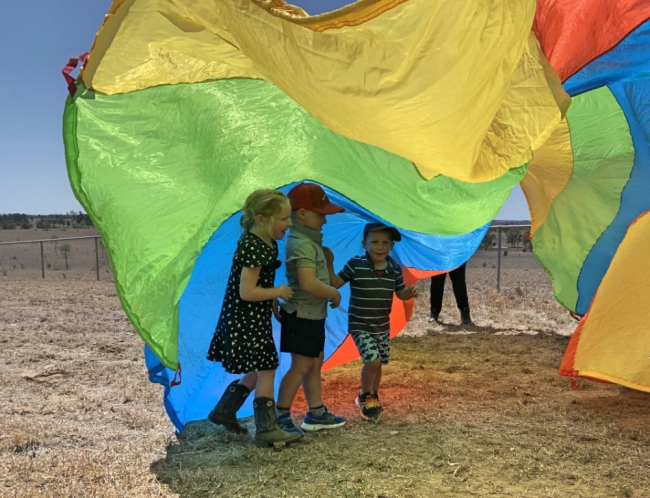
President of the Roughlie Community Center, John Frith, said, “I think it’s a real positive to the area to bring people together more regularly, and the guys obviously share similar challenges and successes. They can get together more regularly than they otherwise would with this facility here, which I think is important on two fronts; socially, and the potential to bring industry forums to the actual doorstep.”
And while the finishing touches to the Community Centre were only made in December 2020, the venue has already hosted a number of community gatherings, and a workshop is scheduled in July for community members to gain an understanding of soil carbon sequestration practices to mitigate climate change and move towards better land management and agricultural practices.

